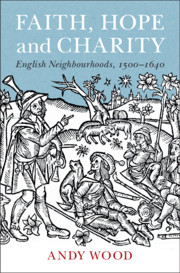Book contents
- Faith, Hope and Charity
- Faith, Hope and Charity
- Copyright page
- Dedication
- Epigraph
- Contents
- Preface and Acknowledgements
- Abbreviations
- 1 Charity Never Faileth: Defining Neighbourhood
- 2 Charity Suffereth Long:
- 3 Now Abideth Faith, Hope and Charity: Place, Neighbourhood and People
- 4 The Tongues of Men and Angels:
- Bibliography
- Index
2 - Charity Suffereth Long:
Neighbourhood and Community
Published online by Cambridge University Press: 05 October 2020
- Faith, Hope and Charity
- Faith, Hope and Charity
- Copyright page
- Dedication
- Epigraph
- Contents
- Preface and Acknowledgements
- Abbreviations
- 1 Charity Never Faileth: Defining Neighbourhood
- 2 Charity Suffereth Long:
- 3 Now Abideth Faith, Hope and Charity: Place, Neighbourhood and People
- 4 The Tongues of Men and Angels:
- Bibliography
- Index
Summary
This chapter discusses the collective basis for communal life in early modern England, showing that contemporaries were strongly averse to division (including religious conflict). Rather, Christian social values encouraged an organic sense of community built upon reciprocity and common interest. Paternalism simultaneously reinforced the social order while providing the poor with tangible benefits. Charitable giving was underwritten by Christian social codes. The clergy and gentry had powerful social expectations made of them, especially to provide for the poor. The collective consumption of alcohol underwrote many social rituals, forms of commensality and festivity, and much of the plebeian social world was centred upon the alehouse. Rituals such as Rogationtide, along with other forms of festivity and play, articulated powerful social norms.
- Type
- Chapter
- Information
- Faith, Hope and CharityEnglish Neighbourhoods, 1500–1640, pp. 40 - 80Publisher: Cambridge University PressPrint publication year: 2020

